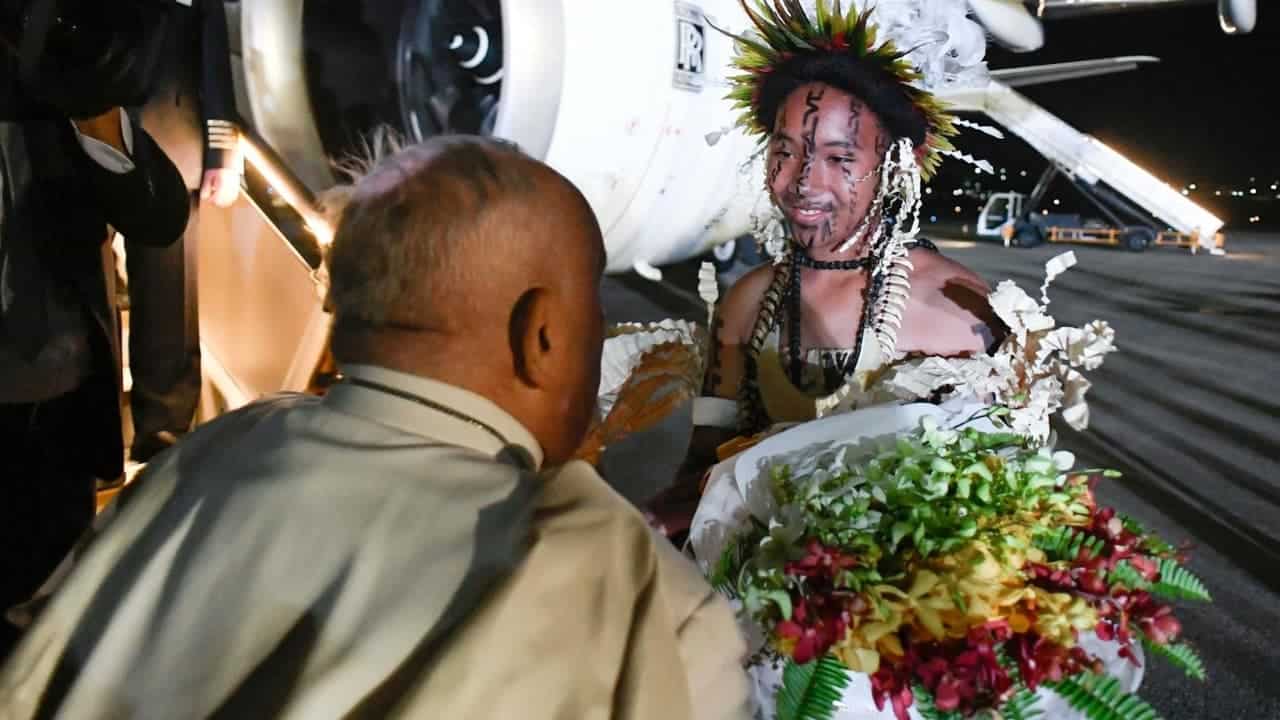PORT MORESBY – Pope Francis has urged national authorities in Papua New Guinea to promote responsible and equitable development, and to bring the violence gripping much of the country to an end. He and the Governor General of Papua New Guinea, Robert Dadae, also made an appeal for the respect and protection of women and their rights in the country, where nearly 70 percent of women experience domestic violence and around 50 percent have been raped.
Speaking to civil authorities and diplomats on 6 September, Pope Francis pointed to the vast cultural diversity of Papua New Guinea, noting that there are over 800 different ethnic groups and languages, as well as its many natural resources. “These goods are destined by God for the entire community,” he said.
“Increasing institutional stability and building consensus on fundamental choices is a prerequisite for integral and fair development,” the Pope said, arguing this requires long-term vision and cooperation amid differing opinions. Alluding to high levels of violence in the country, he voiced hope “that tribal violence will come to an end, for it causes many victims, prevents people from living in peace and hinders development.”
Port Moresby, where Pope Francis landed on Friday evening, is considered one of the most dangerous cities in the world. Levels of crime and violence are especially high, prompting the US Embassy to issue a security alert ahead of the Pope’s arrival reminding citizens of how to stay safe.
In his own appeal on behalf of women, the Pope said: “Let’s not forget, they are the ones who carry the country forward, they give life, build and grow a country, let us not forget the women who are on the frontline of human and spiritual development.”
Pope Francis will be in Papua New Guinea until 9 September, as part of a broader tour of Asia and Oceania which has included a stop in Indonesia, and that will also include visits to East Timor and Singapore. He will meet privately with PNG’s prime minister, James Marape, on Sunday before celebrating Mass and traveling to the remote diocese of Vanimo.
In his remarks Dadae thanked Pope Francis for his presence, saying it is “a testament to the enduring spirit of faith that brings us together across oceans and continents.” He hailed the Church as a key development partner in PNG, and highlighted its contribution to healthcare and education, its advocacy for an end to war and the promotion of human dignity, as well as the role of foreign missionaries in serving the country’s poorest populations.
“Life is a right to human beings as created by God, and we believe it should be recognized and lived in peace and harmony,” he said, and advocated for the rights and respect of women, who are at high risk for domestic and sexual violence in PNG. “We want to emphasize the role of women and their need for protection,” he said, saying, “a female is not just a mere gender, but a special gift from God to bear a nation.”
Dadae also voiced concern about the impact of climate change, particularly rising sea levels in remote islands that are destroying villages and displacing citizens. He acknowledged the Church’s role in assisting these populations, saying, “We want the world to know that there is no more time to discuss […] what the world needs is commitment for action.”
Pope Francis spoke of the need for citizens to feel a sense of hope, saying this “allows them to live fully, giving them zest and courage to undertake wide-ranging projects, and enables them to lift their gaze upward toward vast horizons.” Simply having material needs met is not enough, he said, saying that without a broader spiritual outlook, society “turns in on itself and leads to a dryness of heart.”
“As a result, society loses its way and forgets the correct hierarchy of values” and loses its “drive to move forward and, as happens in some opulent societies, blocks its progress to the extent that it loses hope in the future and can no longer find reasons to pass on life and faith.” Spiritual values have a positive influence in the building cities and strengthening various social projects and initiatives, he said, and pointed to the motto for his visit to PNG, which is “pray.”
“A people that prays has a future, drawing strength and hope from above,” he said, noting that the logo of his visit, the bird of paradise, is a symbol of “of freedom: a freedom that no one and nothing can stifle because it is within us, and is guarded by God who is love and wants his children to be free.”
Addressing PNG’s majority-Christian population, Pope Francis voiced hope that their faith would go beyond the mere observance of rules and rituals. “May it be marked instead by love of Jesus Christ and following him as a disciple,” he said, saying faith is a “beacon of light” that can help society grow and develop, and identify solutions to key challenges.
Pope Francis also lauded the various charitable initiatives being carried out by Christian communities in PNG and urged them to cooperate with public institutions and with Christians belonging to other denominations. He invoked the example of the local <em>beati</em> Peter To Rot, a catechist during World War II who was beatified by Pope John Paul II in PNG in 1995, and John Mazzucconi, a priest and missionary in PNG who was martyred in 1855.
Pope Francis assured his hearers that PNG, while being far from Rome, is “close to the heart of the Catholic Church. For in the heart of the Church is the love of Jesus Christ, who on the cross embraced all men and women.”
<em>Photo: Vatican Media</em>



